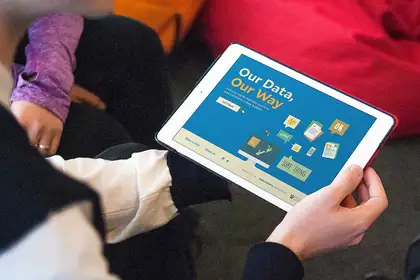
The public has till Monday March 20 to give their feedback, via an online tool designed with help of Massey University, to a government task force gathering New Zealanders' views about how personal data is used and shared.
Toi Āria Design for Public Good, based at Massey University’s Wellington campus, has teamed up with a government taskforce to gather New Zealanders’ views about how personal data is used and shared.
The online tool it has designed, called Our Data Our Way, will test how people weigh up trust and benefit when it comes to the way in which data is used.
Data Futures Partnership chair Dame Diane Robertson says the project will help define when New Zealanders are comfortable sharing their data and having it used. Online participants will also learn how their views compare with other New Zealanders.
Toi Āria Director Anna Brown says the partnership will use what it learns from the online tool and workshops that were held around the country in February to draft guidelines for data use.
The workshops were designed to get people from all walks of life thinking about different situations where their data is, or could be, shared and used for different purposes.
“What we are facing in New Zealand around data use and sharing are the same issues that are being faced around the world, however we have the opportunity to respond in a way that is true to Aotearoa New Zealand and the unique ways that its people know and inhabit the world,” Ms Brown says
Toi Aria, a new research initiative based at the College of Creative Arts, brings together leading design researchers, practitioners and policy makers to deliver design-led, evidence-based services, was tasked with devising data scenarios based around medical data, social investment and the internet of things.
Some of these scenarios included questions around the public’s comfort level of GPs being able to share your medical records, and schools being able to share information about individual pupils with other schools and the wider education sector.
Dame Diane acknowledged that some organisations are unsure about what is permissible when collecting and using people’s data.
“The guidelines will set out ways in which those working with data can build confidence by using data safely and in a way that is trusted and understood,” she says.
Balancing the need to gain essential information with the need to respect people’s privacy was a key consideration for Toi Āria when devising the online tool and in the workshops.
“To this extent, both of these interactive approaches place emphasis on clear information about what the project is, its purpose, who is behind it and what the information collected will be used for,” Ms Brown says.
Toi Āria also drew on the experience and pioneering work of colleagues who are part of the Design and Democracy Project at Massey’s College of Creative Arts and have developed projects based around voter engagement at general and local elections.
“The scenarios in Our Data, Our Way are presented in a New Zealand context but have international precedents,” Ms Brown says.
“Certainly, the approaches we’ve taken to conversing with large numbers of people in a short space of time could certainly be applied anywhere.”
Dame Diana says the partnership expects to publish the draft guidelines for data usage by June.
Click here to have your say till Monday March 20 on how New Zealand organisations should use and share data.